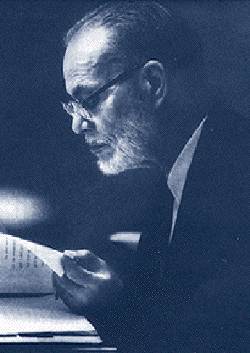 By Yasser Latif Hamdani
By Yasser Latif Hamdani
Last week (February 6) marked the 114th Birthday of one of Pakistan’s greatest unsung heroes. Once again, there was no mention of commemoration of his remarkable like. No sense of gratitude from a nation for which he did so much. He has been wiped out of our memory because he was an Ahmadi, despite his glorious contributions to Pakistan and its cause (see related post on Dr. Abdul Salam).
Sir Zafrullah Khan’s services rendered to Muslims of India, Pakistan and the Third World are second only to that of Quaid-e-Azam Mahomed Ali Jinnah. As a jurist, a diplomat and a patriot he stood head and shoulders above the lesser men who have made a mockery of our republic.
Born in 1893 in Sialkot in what was to become one of the earliest Ahmaddiya households, this small town boy rose to be one of the shrewdest legal minds of his time. His early education was in Sialkot, after which he proceeded to Lahore for his bachelors degree, under the tutelage of none other than the great Iqbal himself. He got his law degree from King’s College London in 1914, where he stood top of his class and was the first person from the Indian subcontinent to do so. He was, like most great figures of that time, called to bar at Lincoln’s Inn.
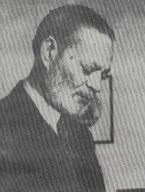
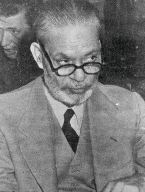
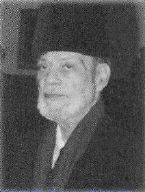


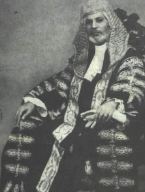
As a practicing lawyer, he soon proved his mettle and had many reported cases to his name. The first major politician to recognize Zafrullah’s talents was Sir Fazli Hussain, the founder of Unionist Party of Punjab. Starting his career in his early 30s as a member of the Punjab legislative Council, he rose to prominence as an indefatigable crusader for Muslims of Punjab. Later he represented the Muslims at round table conference and crossed swords with figures like Jinnah and Gandhi. In 1931, he became the Muslim League president and at the roundtable conference, he cornered no less a person than Churchill in a committee hearing who was forced to accept Zafrullah’s point of view.
Later he was offered a seat on Viceroy’s permanent Council, which he took to further his cause. He also served at varying times as the minister of Railways, Public works, labour and law under the Viceroy. For a brief period, he also became British India’s representative to the League of Nations, just before it was dissolved.
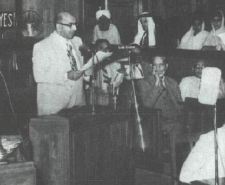
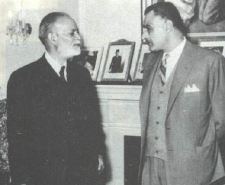
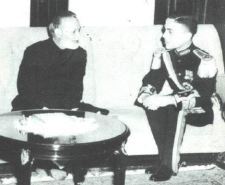
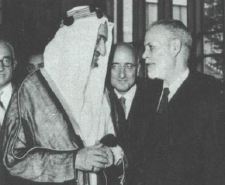
![]()
However his greatest contribution came when he drafted the famous Lahore Resolution, which till this day is the rallying point of Pakistan and Pakistani nationalism. He had been tasked with finding a common point between the popular demand for “Pakistan” and Muslim League’s all India requirements. The Lahore resolution was a broad based solution which left the door virtually open for several solutions and negotiation on the issue of partition. In essence it envisaged 2 or 3 great republics for the Muslim peoples and it was this document which forms the basis not just of Pakistan but also of Bangladesh. For this he got a lot of slack. No less a person than Khan Abdul Wali Khan highlighted Zafrullah’s religious belief to play on the popular conspiracy theory that holds Ahmadis to be British touts.
Later from 1942 onwards, he served as a federal judge (equivalent of an Supreme court C judge) of India and finally took leave on the eve of Pakistan to serve the cause of Pakistan before the Radcliffe Commission, on Jinnah’s personal request. On 25th December 1947, Jinnah appointed him the Foreign Minister of Pakistan. At the UN, Sir Zafrullah emerged as the most eloquent advocate of all third world and Islamic issues. It was Zafrullah whose efforts materialized into the UN Resolutions on Kashmir, which are the basis of the Pakistani case and grievance. Later he became the first Asian president of the International Court of Justice, a singular and unique honor for any Pakistani. He also served, briefly, as the President of the UN General Assembly. He passed away in September of 1983 in Lahore.
A prolific author on the history of Pakistan and Islam, his most famous book was titled “Agony of Pakistan” in which he makes plain the great betrayal which wrested the country from the hands of its patriots into the hands of those who were its greatest enemies. Ironically, today Jinnah’s most trusted lieutenant is not even remembered by the state which owes him so much, including its own founding document. It is the memory of people like Zafrullah Khan that will keep alive the original idea of Pakistan and there is no doubt that one day the posterity will reclaim its true destiny as a progressive and modern republic.
Yasser Latif Hamdani is a lawyer in Lahore and a researcher of the history of the Pakistan Movement.



















































Dats wat Quaid Said:
“…make no mistake, Pakistan is not a theocracy or anything like it. Islam demands from us the tolerance of other creeds and we welcome in closest association with us all those who of whatever creed are themselves willing and ready to play their part as true and loyal citizens of Pakistan.”
“In any case Pakistan is not going to be a theocratic state to be ruled by priests with a divine mission. We have many non-Muslims-Hindus, Christians and Parsis – but they are all Pakistanis. They will enjoy the same rights and privileges as any other citizens and will play their rightful part in the affairs of Pakistan.”
and what was done after quaid makes them all ghadar
nuf said:salam:
Just read this article in Delhi’s popular Urdu daily Hindustan Express about Ahmadiyya community and its ‘special’ links with British and similar things discussed here already. The article ‘Qadiani angrezon ke wafadar’ shows that the issue is equally hot in India.
http://www.hindustanexpressdaily.com/qareenkasafha .htm
Zahra, though I agree with most of your sentiments, but I can’t agree with your point about the examples of Israel and trade with India to say that he was ahead of his time.
The context in which trade with India is being talked about today is very different from the situation in those early days after partition, so lets not confuse them with each other.
At the time of partition, Pakistan’s biggest trading partner was India. Pakistan had inherited no industry, so we were totally dependent on India even for basic consumer goods and this dependence was likely to continue for the foreseable future. Breaking off these trade links was certainly not on the minds of our founding fathers. On the other hand, continuing with the trade was a very obvious thing to do and no saine Pakistani would have wanted to do otherwise in those days. There was nothing that extra-ordinary or ‘ahead of times’ about it.
Now, how did the free trade with India get disrupted and who was responsible for it? How many of us know?
@Zahra
I completely agree with your point of view. However I have personally learnt another lesson from this post:
Faaltoo Aqal Mujh MaiN Thee hee naheeN
Mazhabee Behas MaiN naiN kee hee naheeN
Roughly translated as
I did not have the extra intellect
To get indulge into religious arguments
As Mr/Miss MU is so busy in copy pasting stuff that he/she thinks ll help her BIGGER CAUSE, lemme help him in answering one of “Truefacts”‘s question;
1)He didn’t attained the funeral of Quaid-e- Azam, even he was present at time
Answer: Reason is very simple, Ahmadis are not allowed to attend funeral of any Muslim, u know :P they are spreading love thats why. Lemme give u reference.
“Our observation is that the Promised Christ (Mirza Qadiyani) treated the non-Ahmadis as the Prophet Muhammad (Sallallaho Alaihe Wassallam) treated the Christians. He made our prayers separate from those of non-Ahmadis. He prohibited us from having marital relations with them & participating in their funerals. So, in all respects we have broken our ties with them. There are two types of relations: religious & worldly or temporal. The greater source of religious relation is the common rituals of worship, while the greater source of worldly relation is the matrimonial alliance. And we have been prohibited from having both types of relations.â€